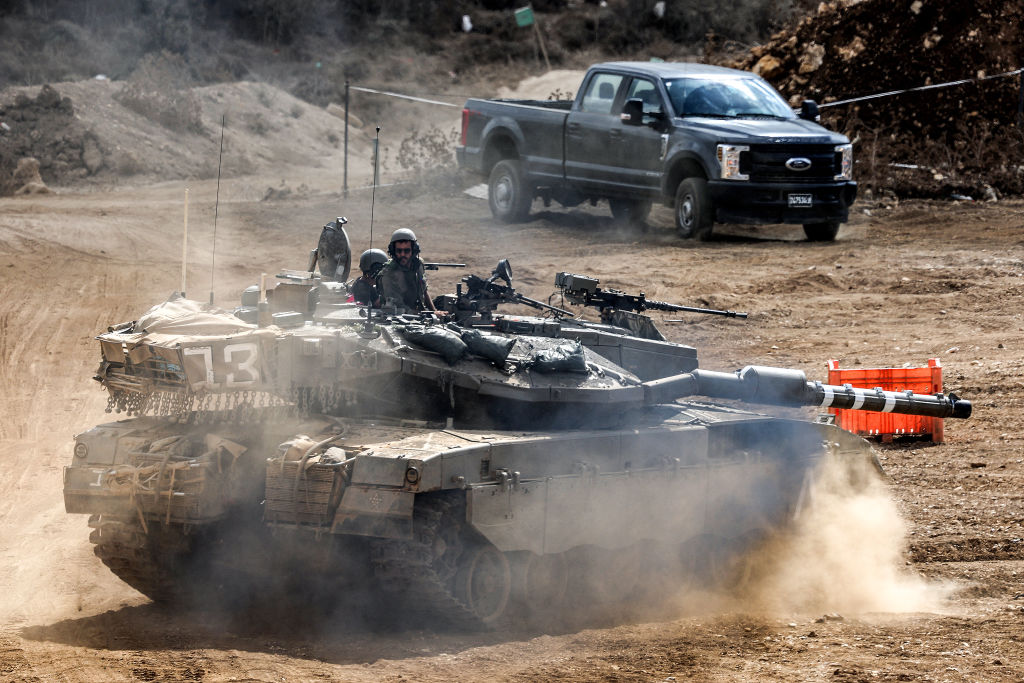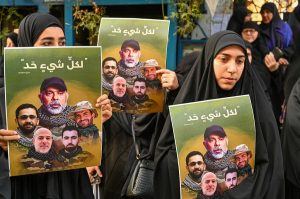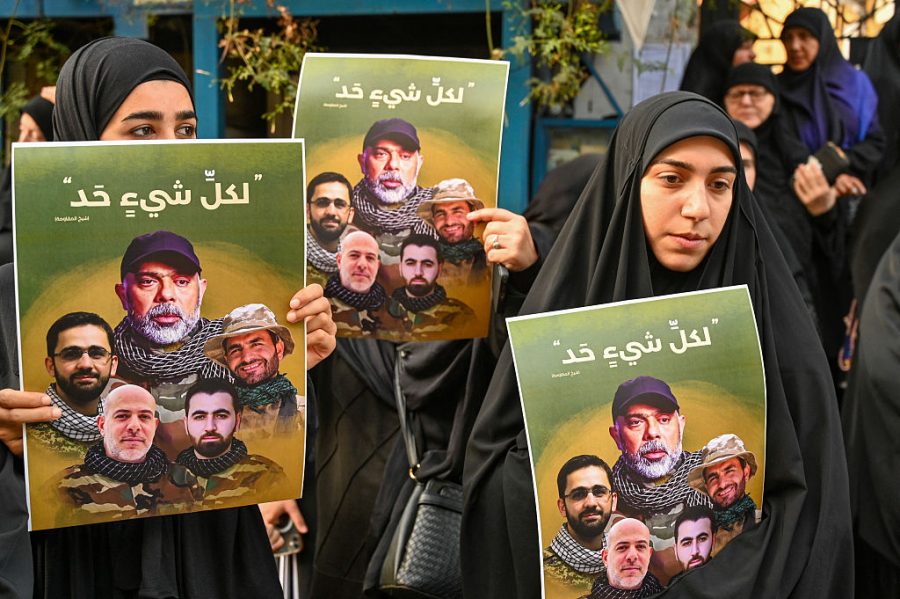Anything written on the Middle East at this moment in history is almost instantly out of date. As Lenin said: “There are decades where nothing happens; and there are weeks where decades happen.” The Arab-Israeli war in 1967, the Iranian revolution in 1979, the invasion of Iraq in 2003…the region may once again be at one of those forks in the road that dictate the fate of nations for years to come. Journalists’ predictions age like milk out of the fridge. Nevertheless, here are some:
Israel attacks Iran. This isn’t a hard one. The question is what form that attack will take. The prime minister, Benjamin Netanyahu, has wanted to bomb Iran’s nuclear facilities before, only to be stopped by the US. This time he may feel, as his predecessor Naftali Bennett put it, that, “This opportunity must not be missed.” The uranium processing plant and centrifuge factory outside the city of Isfahan would be an easy target. But the main enrichment plant at Natanz is housed in a vast underground complex, and another plant at Fordow is dug into the side of a mountain. The Israeli pilot who led the Osirak raid in 1981, on an Iraqi nuclear plant, told me once that only ground troops could finish the job in Iran.
Israel bombs Iran’s oil wells. This may be more likely, especially as hitting nuclear plants could cause another Chernobyl. The terminal at Kharg island exports more than 90 percent of Iranian oil and is a relatively short flight by bomber from Israel. There is a second terminal at Jask, on the other side of Iran but served by a long and vulnerable pipeline. And most of Iran’s oil production is concentrated in just four main wells. Bombing all these places would cut off the money that pays for Hezbollah and Hamas. Iran might well respond by hitting oil refineries in Saudi Arabia, or getting the Houthis to do it. The Saudis would ask the US for help.
The Iranian regime falls: This is a bit of a wild prediction. But at the very least, the regime would be shaken if Iran’s oil wells and pipelines were destroyed. Without oil, Iran’s economy would collapse. The clerics are already unpopular, their hold on power weak despite the secret police, the hanging judges and the Basij militia. Mass demonstrations erupt regularly, against the hejab and clerical rule but driven by rising prices and falling wages. Netanyahu addressed this anger when he spoke to the Iranian people over the heads of their leaders. If the regime really cared about you, he said, it would stop wasting billions of dollars on “futile wars” and start improving your lives. He predicted revolution. “When Iran is finally free, and that moment will come a lot sooner than people think, everything will be different.”
All-out war: Iran finally orders its much threatened “crushing response.” Hezbollah fires thousands of missiles to overwhelm Israel’s air defenses. Shia militias in Iraq and the Houthis in Yemen join the attack: the “ring of fire.” Iran’s supreme leader, Ayatollah Ali Khamenei, has hesitated to do this, fearing a truly terrible response from Israel. He has followed a path of what has been called “prudent resistance.” But if the regime feels it’s in a struggle for survival, all that could change. As is widely predicted, this could push Tehran into a dash to build the nuclear bomb they are apparently so close to achieving. Netanyahu says that for Israel, too, this is an “existential” struggle.
Bibi survives: Because he always does. A year ago, Israel’s prime minister was stratospherically unpopular, having divided the country over judicial reforms opponents saw as a power grab. Many Israelis blamed him for the failures that allowed Hamas to massacre more than 1,200 people on October 7 last year. But today, his approval rating are high and Israelis are behind him in the struggle to defeat Hezbollah and Iran. The longer Israel’s wars continue, the further 10/7 recedes into the distance. He’s accused of prolonging the wars just to stay out of jail, facing three separate corruption trials. But if he remakes the Middle East in Israel’s favor, all will be forgiven.
Israel gets bogged down in Lebanon. Israel calls what’s happening in southern Lebanon “limited, localized, and targeted ground raids” — not an invasion. But Hezbollah has dug its tunnels even deeper than those in Gaza, and the IDF has yet to destroy all of those after a year of fighting. They could be in Lebanon for a long time. If Israel removes Hezbollah from all the land between the border and the Litani River, troops would have to patrol this buffer zone. That’s an opportunity for Hezbollah, as their leader, Hassan Nasrallah, said before he was assassinated. It’s much easier to kill an infantry soldier than an F35 pilot. Nasrallah said Hezbollah would turn the buffer zone into ‘hell’ for the Israeli army.
Civil war in Lebanon: Lebanese hate Israel for bombing them but many are furious with Hezbollah. In Sunni Tripoli, they handed out sweets to celebrate Nasrallah’s death. There are hundreds of thousands of refugees from Syria, who remember how Hezbollah helped the regime there to bomb and starve them. There’ve been attacks on vehicles carrying Shia refugees north because they had Hezbollah flags or stickers. Such small incidents can blossom into widespread violence. Checkpoints appear, the militias step from the shadows. The state and the armed forces in Lebanon are fragile. They could do little to stop a civil war.
Trump wins: Is this what Netanyahu is trying to achieve? It might be the effect of an Israeli offensive against Iran, already being called 2024’s October surprise — the original was in 1980, when Iran delayed releasing American hostages so Jimmy Carter lost the election. President Biden doesn’t want a regional war in the Middle East in the dying days of his administration. He doesn’t want rocketing oil prices as Americans vote. And he especially doesn’t want to have to put US forces into harm’s way to help Israel. But Bibi’s career has been defined by defying US presidents. Bill Clinton exploded after meeting him: “Who the fuck does he think he is? Who’s the fucking superpower here?”
Or all of this is 180 degrees wrong. The Biden administration gets a ceasefire across the region, Israel stays its hand, the ayatollahs survive, Lebanon remains calm, Bibi leaves office, and Kamala Harris wins. There have been a series of developments over the past few months in the Middle East that with hindsight were inevitable, but which came as a shock at the time. Still, if every party to the conflict thinks they have to “restore deterrence” and “escalate to de-escalate” there is a grim logic about the spiraling violence. The most certain prediction is that more civilians will die under bombs and missiles: the “blood dimmed tide” continues to rise.


























Leave a Reply